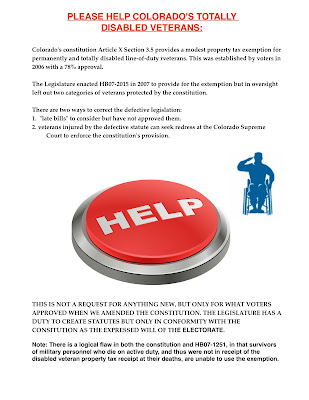"The Colorado Legislative Council plays a big role in the initiative process in Colorado. The Legislative Council meets to approve all language for all ballot measures that have qualified in Colorado. Also, Legislative Council provides a fiscal impact statement which is mandatory for all ballot measures. This is done to determine impacts on any state agency or local government.Colorado's voters were sent the Blue Book back in 2006, and CLC explained which veterans were specified in Referendum E. Included were explanations that the Referendum specified totally military personnel retired by their services, and described VA-rated totally and permanently disabled veterans, "Veterans are rated 100 percent permanently disabled when a mental or physical injury makes it impossible for the average person to hold a job and the disability is lifelong." Referendum E received 78% of the votes, becoming Article X Section 3.5 of the Colorado constitution.
Once the analysis is complete, the Legislative Council prepares an official booklet which is published to Colorado voters on the actual language and fiscal impacts of ballot measures. The name of the official booklet is known as the Blue Book."
In 2007 the Legislature undertook to create statutes to implement the constitution's changes. Their final work efforts were then routed past CLC for legal form, content and other requirements to become law. But CLC, or the Legislature, goofed. Twice.
First, the final legislation somehow dropped reference to totally disabled military personnel retired by the Army, Navy and Air Force. Second, although the Blue Book explained to the electorate (and we approved) that totally and permanently disabled vets "are rated 100 percent permanently disabled when a mental or physical injury makes it impossible for the average person to hold a job and the disability is lifelong," CLC and the Legislature somehow specifically barred VA's disability category called "totally and permanently disabled individual unemployability," or TDIU. The electorate, relying on CDC's Blue Book, amended the constitution and specifically protected vets who couldn't hold a job and whose disability was lifelong.
But CLC then specifically rejected such unemployability, somehow backtracking on its Blue Book as well as the decision of the electorate to amend the constitution, in part overturning the voters' decision on Referendum E.
Today, the Colorado Department of Military and Veterans Affairs refuses to follow the constitution but instead relies on the flawed statute, both of which CLC worked on. CDMVA thus defies the constitution and refuses the exemption to qualified vets seeking the benefit. State and county forms read, but without legal foundation, "VA employability awards do not meet the eligibility requirements."
Why couldn't CLC get the final statutes to comply with the constitution and the guidance CLC gave the electorate? Why does CLC say VA permanent and total service-connected unemployability disability awards are unqualified for the exemption?
Why is the will of the people, expressed in our approval of Referendum E to amend the constitution, defied by CLC and the Colorado Legislature? How can CLC be called to account for this, and to correct their mistakes?




